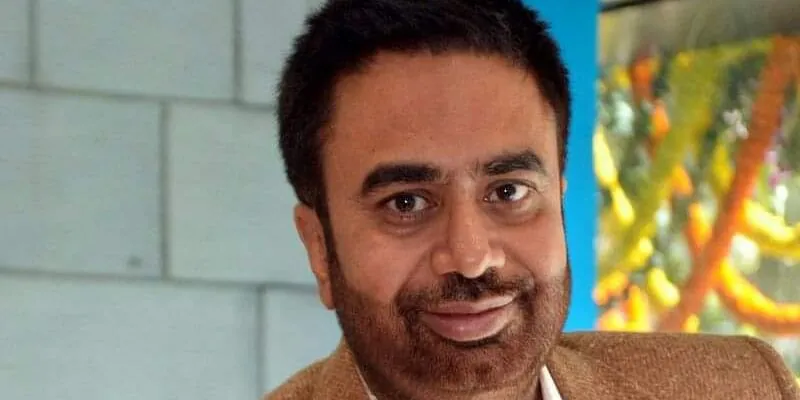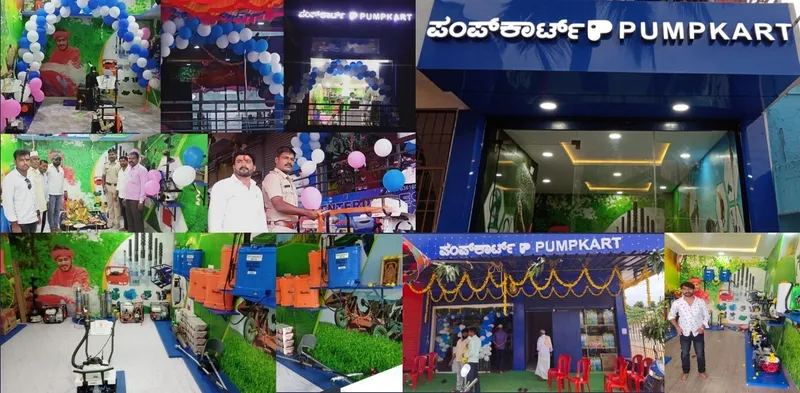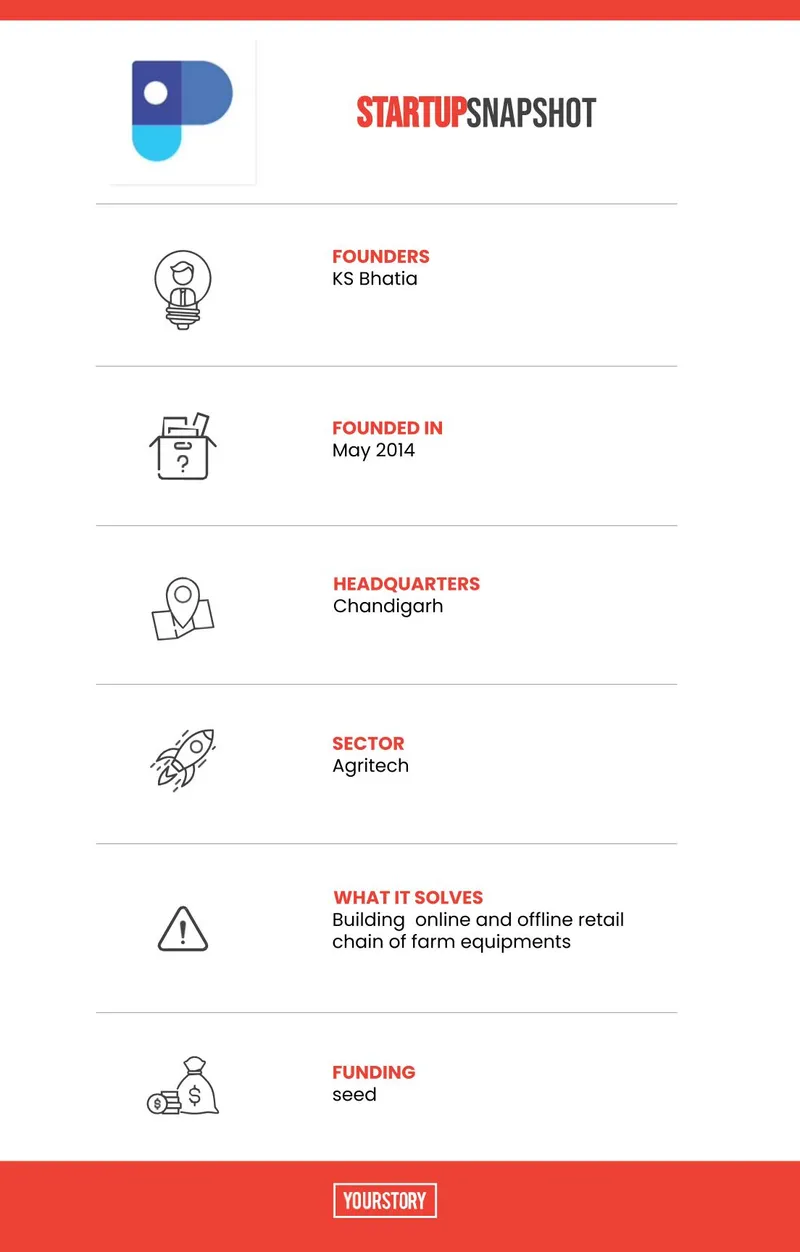[Startup Bharat] After 2 failed startups and recognition from Google CEO, this founder built a marketplace for farming needs
Agritech startup Pumpkart started expanding in 2020 by opening franchises for farm equipment in rural areas. It has set up more than 75 stores in a year and aims to build 500+ stores across India by December 2022.
Third time’s the charm, and so it was for Dr KS Bhatia, the Founder and CEO of , a modern retail chain of farming equipment.
Bhatia, a chemical engineer and an MBA graduate from IMT, Ghaziabad, is no stranger to startups. His first two startups failed but his mind continued working.
He soon realised that farmers needed to travel to nearby cities to purchase farm machinery and tools due to the unavailability of stores in rural areas. Even then, they were unable to get modern tools and machinery that were often available in select Tier 1 cities.
In May 2014, Bhatia launched Pumpkart to help farmers replace old, traditional farm equipment with modern farm machinery. His aim was to modernise rural India by targeting at least 10 percent of the total 7,00,000 villages, and converting rural retail into modern retail.
Pumpkart is bringing modern-retail stores to Tier 2 and Tier 3 towns, and rural areas of the country. It helps convert small unorganised retail stores into branded stores, offering payment options through debit/credit cards along with insurance.
Bhatia believes it is important to encourage retail in rural areas to ensure uplift of rural areas at par with urbanisation.
“The focus on urbanisation has left rural areas neglected, with a lack of modern retail stores and problems for farmers. Through Pumpkart, we have set up modern retail stores in the hotspots of Tier 2 and Tier 3 towns, and rural areas. Farmers no longer have to travel to nearby cities to get the agricultural equipment they need,” he says.

KS Bhatia, Founder and CEO, Pumpkart
Bhatia, who has more than 18 years of experience in pump supplies, says a solitary incident pushed Chandigarh-based Pumpkart into the spotlight.
In September 2015, Google CEO Sundar Pichai quoted the startup as an online success story in his ‘Digital India’ speech before Prime Minister Narendra Modi in California.
A lot has changed since then, highlights Bhatia.
The journey so far
With a personal investment of Rs 20 lakh, Pumpkart was started in May 2014 as a B2C model - the platform used to educate people about the right product by sharing technical specifications. It initially focused on agricultural and domestic pumps only.
“Our team took care of educating farmers and households about the different varieties of water pumps before they finally made a purchase,” Bhatia says.
Within a few months, business picked up for the venture, a subsidiary of Grow India Ventures Pvt. Ltd.
By February 2016, the platform’s monthly turnover was Rs 45 lakh. However, there was a huge glitch in the B2C business - the high cash burn rate.
“We were burning high cash at a very fast rate, which was widening the loss month over month. So, we decided to change the business model,” Bhatia says.
In March 2016, the platform turned to a B2B model. After shifting the target business to retailers, Pumpkart hit the right spot and soon brought more than 6,000 retailers across India on board.
Pumpkart allowed these retailers to buy and sell pumps through online-to-offline (O2O) stores.
Shift to modern retail stores
In September 2019, Pumpkart raised a seed round from Dr Ritesh Malik, Founder and CEO of Innov8, and Dr Dinesh Dua, Chairman for Startups & Entrepreneurship for CII.
In December 2020, the startup raised $2 million from the Karnataka government under the country’s most aspirational programme, Samruddhi Scheme. Under this scheme, the startup had to set up more than 100 stores across Karnataka. So far, Pumpkart has successfully handed over more than 75 stores to applicants across the state.
After this opportunity from Karnataka government, Pumpkart, which was till then focused on agricultural and domestic pumps, started dealing in farm machinery and agricultural equipment such as earth augers, mini-tillers, chainsaws, DOL starters, crop harvesters, HTP sprayers, petrol engine pumps, battery sprayers, chaff cutters, etc.
Today, it even deals in accessories like hose pipes, spare parts for farm machinery, submersible cables, DOL panels, and control panels.

Earlier, Pumpkart used to reach its target audience, farmers, through retailers within the B2B business model. It has now pivoted to the franchise model through these technologically-driven stores rather than the common brick-and-mortar stores.
Bhatia says, “These modern retail stores are technology-driven stores where customers from rural areas are able to place orders with the help of kiosks. This enables Pumpkart to deliver better shopping experiences to people living in rural areas. This way, Pumpkart’s ambition of building a physical marketplace for manufacturers and farmers will also be fulfilled.”
Pumpkart now functions purely as a B2B2C platform for farm machinery and agricultural equipment in India.
Talking about the price range, Bhatia says the minimum price for farm equipment is Rs 3,000 and goes up to Rs 60,000 for heavy machinery and tools. Some heavy-duty water pumps even go up to the price range of Rs 1 lakh.
Pumpkart procures its products through multiple channels and also has its own white-label brand, Panatech, which manufactures water pumps and DOL starters.
Pumpkart hit GMV revenue of Rs 4.22 crore in FY21 and aims to grow this to Rs 10 crore in FY22.
Opportunities and way ahead
The Indian agricultural machinery market is expected to reach Rs 901.41 billion by 2024, expanding at a CAGR of 10.70 percent during the 2019-2024 period, a research report by Planet Market Reports said.
“Obsolete and inefficient machinery means farmers are incapable of doing full justice to their farmland’s potential. Farmlands in the US give higher returns to farmers as compared to Indian farmlands because of lack of technology and innovation,” Bhatia says.
“To ensure agriculture contributes more towards the GDP, it is important that 100 percent of farmers use modern farm machinery and agricultural equipment. That way, they will be able to yield more and sell more.”
Pumpkart is on a mission to organise the farm equipment market of approximately Rs 65,000 crore. A large proportion of the market has been captured by importers, wholesalers, and unorganised players, and there is no prominent player in the industry, he says.

“Pumpkart’s goal is to make sure every farmer in this country has farm equipment and machinery driven by technology. Our aim of strengthening the Indian agriculture ecosystem is all about contributing towards Prime Minister Narendra Modi’s vision of a $10 trillion economy,” he says.
The brand has been “quite a hit” in South India. The COVID-19 pandemic costs thousands of people their jobs and led them to ultimately adopt entrepreneurship skills in the agricultural sector.
“Today, more farm equipment and agricultural machinery are purchased and used in various regions of South India. Pumpkart has enabled a lot of people with employment and entrepreneurship by opening more than 75 stores across Karnataka,” Bhatia says.
Pumpkart has also designed and delivered a store entirely built on wheels and hooked with a tractor.
The firm recently inked a pact to set up 1,200 stores across Uttar Pradesh, and the founder believes that partnerships like these will generate employment and entrepreneurship opportunities for people in rural pockets.
Pumpkart is also in talks with investors to raise its Series A round.
Edited by Teja Lele


![[Startup Bharat] After 2 failed startups and recognition from Google CEO, this founder built a marketplace for farming needs](https://images.yourstory.com/cs/2/e641e900925711e9926177f451727da9/CopyofImageTaggingNewBrandingEditorialTeamMaster11-1644303327959.jpg?mode=crop&crop=faces&ar=2%3A1&format=auto&w=1920&q=75)






